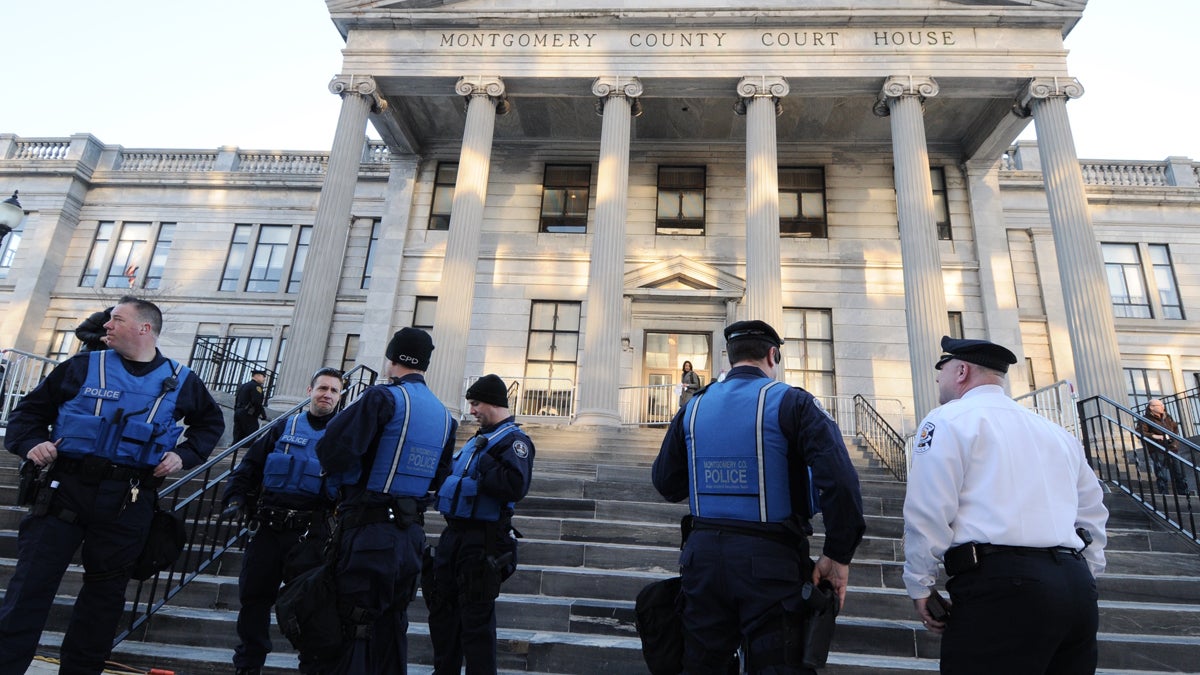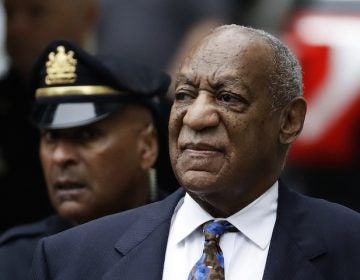The Cosby trial will not be televised — or tweeted live
Listen
The Montgomery County Courthouse in Norristown, Pennsylvania. (Bastiaan Slabbers for WHYY)
The sexual assault trial of Bill Cosby starting Monday in Montgomery County has been called the biggest Hollywood celebrity trial in the mobile news era.
But the Cosby court drama will not be televised. And don’t expect live tweets or other updates while court is in session.
Pennsylvania court officials have warned the hundreds of reporters expected to gather at the courthouse in Norristown, Pennsylvania, to cover the Cosby case: No cameras are allowed. Reporters must turn off their phones. And anyone who violates these rules could be held in contempt of court — and subject to a fine or even jail time.
“You’re probably dealing a little bit with the fear of the unknown potential of new technology,” said Kathy Stanchi, a law professor at Temple University.
Listen to the latest episode of WHYY’s podcast, ‘Cosby Unraveled.’
The rules governing court proceedings have often failed to keep up with technology, Stanchi said. Pennsylvania courts established no-filming rules back in the 1970s, and the guidelines were last updated 15 years ago.
“So, having television coverage in the courtroom involved big cables, giant cameras and things like that,” she said. “You can imagine that was pretty significantly disruptive to the course of the trial.”
Even though professional cameras are now far more compact, the blanket ban on bringing cameras into Pennsylvania courtrooms remains.
Trial judges across the state, though, have wide latitude over regulating the use of social media during trials. For example, Philadelphia County forbids the media from tweeting during court hearings; in Dauphin County, a trial judge has allowed reporters to tweet live from a public corruption trial.
The Cosby case stems from a 2004 encounter at the 79-year-old entertainer’s Cheltenham home with a woman then employed by Temple University. Andrea Constand has said she was drugged and molested; Cosby said they engaged in consensual sex acts.
Montgomery County Judge Steven O’Neill will require all journalists to have their phones turned off while court is in session during Cosby’s trial. When court is in recess, reporters will be able to use their phones to tweet or file stories in the hallway of the courtroom.
Court officials have justified phone bans in the past by citing witnesses who have concerns over privacy or the fear of retaliation. There is also a worry that judges, attorneys or witnesses could perform for those recordings, turning the process into a mockery. And officials say keeping technology out ensures that the process is fair and that no outside forces — such as commentary on social media — influence the proceedings.
Stanchi cites yet another factor: “To avoid making the trial into some prurient entertainment circus for the public,” she said.
Vivid details on film, in print
Greg Leslie with the Reporters Committee for Freedom of the Press said the rules are out of step with modern times.
Reporters attend a public trial to bear witness for the millions who can’t be there in person, Leslie said. Banning the use of phones, cameras or microphones inside the courtroom makes the whole process less accountable, he argued.
“At worst, what it does is guarantee that a less accurate version of events will get out to the public,” he said. “So what’s the benefit of that?”
Linda Deutsch understands the value of recording trials. She covered high-profile court cases for the Associated Press for 48 years. She wrote about the murder trial of OJ Simpson, where TV cameras were rolling from start to finish. Deutsch said that created a historical record.
“He had his moment when he tried on the famous gloves and said they did not fit him,” Deutsch said. “And that was a moment for history. And it was televised.”
While Deutsch said the Cosby trial should be filmed, she said solid reporting will fill the gaps left by a lack of video. Many Americans, she said, think that the 1971 trial of Charles Manson was filmed. But it wasn’t. She knows because she was there.
“You’ve seen still pictures of the defendants for so many years, and you have read such vivid accounts of what was said in the trial and the horrors of the murders and Manson and all his pronouncements,” Deutsch said. “None of that was done on camera.”
Artificial barrier or hedge against fragmentation?
If reporters had their way, the Cosby trial would be covered with hundreds of live videos and tweets. But Deutsch said that could provide the public with a fragmented view.
There may even be a silver lining to forcing journalists to turn off their phones, Deutsch said — while admitting that she grew up in a different era of journalism.
“If you are sitting there looking at a screen, you are not looking at the witness. You’re not looking at the judge,” she said. “You’re not looking at everything going on in the courtroom that makes a trial what it is.”
But Leslie countered that many Americans are now used to experiencing news as it happens on Facebook and Twitter. And shutting out those platforms undercuts the American tradition that the courthouse doors should always be open to the public.
“And so it seems almost like an artificial barrier when we have this very natural, straightforward way to monitor trials across the country by electronic coverage,” he said.
Network television will not have much to work with, but footage sure to be repeated will feature Bill Cosby and his legal team entering and leaving the courthouse over and over again.
WHYY is your source for fact-based, in-depth journalism and information. As a nonprofit organization, we rely on financial support from readers like you. Please give today.




